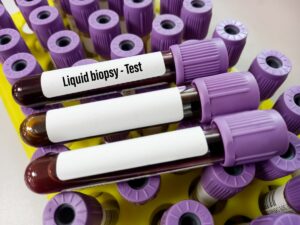Exciting trends in precision health are reshaping the medical landscape at both the primary and specialty care levels. Innovations and clinical advancements are enabling more genetic insights than ever before – and that momentum will only increase in the years to come.

Today, oncologists can identify targeted therapies for certain patients using only a blood sample, rather than a traditional tumor biopsy. In both specialty and primary care clinics, a patient’s medications can be tailored to their unique genetic makeup. In the future, ongoing research into the complex underpinnings of common diseases, such as cardiovascular disease, may pave the way for improved risk assessment and prevention. And the continued development of gene and cell therapies will offer hope to more and more patients.
Keeping up with this level of innovation is no easy feat for healthcare providers or payors. More than 175,000 genetic tests and testing products are on the market, with more than 10 new tests and therapies introduced daily. This pace of change challenges providers’ and payors’ ability to make medically appropriate and cost-effective decisions.
How can payors better harness the promise of precision health – and ensure that decisions around genetic testing and gene and cell therapies are based on evidence? Our experience points to several key strategies.
1. Deliver genetics expertise to clinicians at the point of care.
With so many genetic tests and therapies on the market, it’s not realistic to expect payors or providers to have the in-house expertise needed to determine whether a test or therapy is clinically indicated and medically appropriate for a particular patient. A decision-support model for genetic testing products – provided within the framework of a prior authorization process and backed by a multidisciplinary team covering all genetic subspecialties – is a value differentiator for both payors and providers.
Most prior authorization processes for genetic testing are designed to simply provide a “yes” or “no” answer to requests. These answers typically do not include decision support features that could help pinpoint whether the patient may benefit from a different test based on the clinical scenario. The reason: payors usually do not have the level of resources needed to provide this type of support, such as a team of genetics specialists on staff.
However, when payors invest in outsourced genetics specialists’ expertise to drive better decisions at the point of care, the specialists can not only provide instant approval for clinically relevant tests, but can also hold conversations with clinicians in real time to support more informed decision-making. It’s an approach that eliminates binary yes-no decisions around genetic testing that could result in unnecessary denials and appeals – and more importantly, delays in patient care.
At InformedDNA, our experience with one national payor showed that in 25% of these conversations, there was consensus that a more clinically appropriate test was available than the one originally ordered – and ordering providers welcomed expert genetics support.
2. Develop best-in-class medical policies for genetic testing and gene and cell therapies.
When it comes to developing medical policies for genetic tests and products, payors are challenged to stay ahead of the curve. It isn’t possible or reasonable for payors to have a medical policy for every genetic test available. However, payors can partner with genetic experts to develop “umbrella policies” by type of test – such as those for hereditary cancer or reproductive genetics – that can be more readily kept current. They can also leverage genetics expertise to identify “never allowed” tests that can be automatically denied based on lack of clinical evidence.
As more gene and cell therapies come to market, payors may have trouble determining how to make them available to their members, as well as which members may benefit. These therapies – some of which cost hundreds of thousands of dollars per treatment – don’t fit well with traditional managed care models. As a result, payors may grapple with supporting access to this aspect of precision health while ensuring quality care and effectively controlling costs. By collaborating with a team that has deep genetics expertise, payors can develop evidence-based policies for gene and cell therapies to establish appropriate medical necessity criteria – and ensure the right patients have access to these potentially life-changing treatments.
3. Provide on-demand, up-to-date policy and decision support for case adjudication.
From new genetic tests to evolving professional society guidelines and CPT® codes, keeping up with the pace of change in precision health can be challenging for clinical reviewers. Payors can better support their reviewers by providing them with access to on-demand policy and case adjudication tools. These tools can promote interrater reliability, reduce case times, and decrease administrative burden. And if payors utilize content created and maintained by experts in genetics, they can feel confident that determinations will be appropriate and current.
4. Require genetic counseling as part of the medical necessity determination process.
Genetic counseling empowers members to make informed decisions about genetic testing. These decisions are often complex and can have a significant impact on patients and family members alike, and genetic counselors are specially trained to help people navigate these issues. In addition to improving member relations, genetic counseling also helps avoid unnecessary medical spend. At InformedDNA, our work with one national payor found that when genetic counseling was a required component of the medical necessity determination process, one out of five individuals who received counseling with proper informed consent decided not to pursue genetic testing.
Collaborating for greater value
The world of precision health is ever-changing, with more genetic products available each day. By developing strong partnerships with genetics experts, payors can more effectively harness the promise of precision health. Ensuring that clinical evidence guides the use of genetic tests and therapies can significantly improve both the patient and provider experience.



